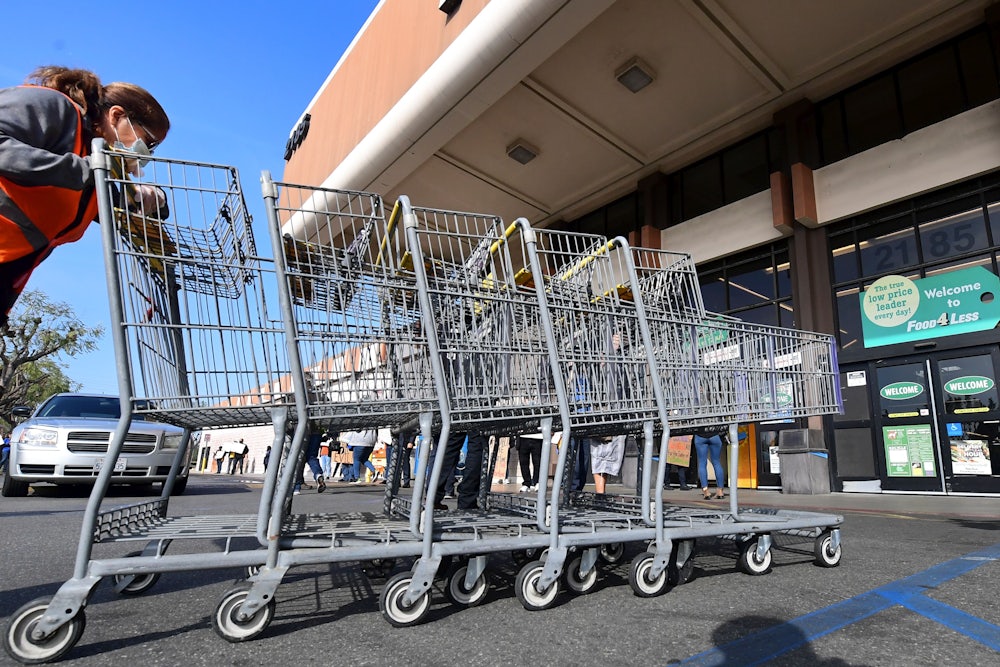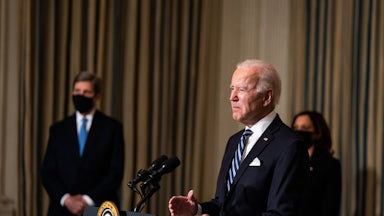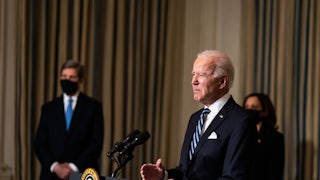On Thursday, The Washington Post reported that Kroger, the nation’s largest grocery chain, has elected to close two stores in Long Beach, California, after the local city council passed an ordinance requiring a temporary $4 pandemic raise for grocery workers. Kroger, which doubled its profits in 2019, targeted these stores to send a message that the company will not be coerced into paying its workers a fair wage during the pandemic—or ever. It’s a threat. It also might work.
The move to close the Ralphs and Food 4 Less stores in Long Beach was branded, by both Kroger and the state’s grocers association—which represents the interests of grocery chain companies, not workers—as a business decision. It isn’t. This is a political play. As other city councils, like those in Oakland and Los Angeles, have moved to enact similar wage-increase ordinances for frontline workers, businesses such as Kroger have threatened this kind of action. (The grocers association previously sued the Long Beach, Oakland, and Montebello city governments over the ordinance.) But it’s not because the grocery chains don’t have the money to fund the pay bumps; it’s because doing so would represent a long-term threat to America’s tried-and-true business model: underpaying and overworking employees.
Closing the stores amid public outrage gives Kroger and other companies the chance to whine loudly about labor regulations in the press, while quietly padding their already stuffed coffers. Remember, we’re talking about a grocery chain operating over 2,000 stores. Shuttering two stores and putting roughly 200 people out of work in one of the most volatile economies in modern times to make a point to other cities considering wage ordinances is probably worth the risk in its eyes. Kroger has courted outrageously bad press before: In March, the company rolled out a $2 pay increase for its workers, only to roll it back come the first week of May. Outrage from union leaders resulted in the company announcing a onetime “thank you” payment—marking the final time the company agreed that its workers deserved compensation for risking their lives.
California has been a hotbed for such actions lately, though it’s certainly not alone. With the passage of Prop 22 during the November 2020 election, companies were freed to dump salaried employees in favor of cheaper (read: no union wage, no health insurance) gig workers. It’s exactly what Albertson-owned grocery chains Vons, Safeway, and Pavilions moved to do in early January, transitioning what had been a longtime in-house service to third-party contractors, knowing they would save a few bucks. “Essential workers” be damned.
This kind of spite attack isn’t new. In 2017, the New York newsroom of DNAInfo and Gothamist were shuttered by owner Joe Ricketts a week after they voted to organize a union. This past fall, a Brooklyn private school with an entry tuition of $46,400 sought to undermine a burgeoning teachers’ union, claiming it prevented the business from fully practicing “our Quaker values of respecting others and celebrating every individual’s inner light.” Jeff Bezos, the second-richest man in the world, will leave his role as Amazon CEO with a defining legacy of wringing an inconceivable amount of money out of a business model and company culture built atop blocking union drives and positioning the company’s packaging facilities in states with the lowest possible labor regulations. (Right on his heels, the Bessemer, Alabama, facility appears on the cusp of becoming the first Amazon outfit to unionize.)
Kroger’s targeted closing of the Long Beach stores speaks to an immediate need for two things that the new administration and Congress can easily offer, if they so choose. The first is a federal minimum wage raise to at least $15 and additional salary boosts for all frontline workers, not just grocers. Teachers, health care workers—anyone whose job entails in-person, face-to-face work on a daily basis during a pandemic closing in on a half-million dead Americans deserves, at the bare minimum, to be paid well above their normal rates. And this must be followed by a minimum wage increase that takes effect by the end of this year, not by 2025, as multiple reports from the White House currently have it. (As workers have been forced to note for decades, the cost of living, unlike the set $15 rate, will only increase over the course of that five-year plan, rendering the overdue raise less effective. The Fight for $15 is nearly a decade old. The bar on a living wage has moved.)
By stretching out the federal minimum wage increase and pushing pandemic “hero pay” initiatives onto states and local governments, Congress and the White House are allowing companies like Kroger to set the terms of engagement. Another city passes an ordinance? Kroger has its playbook ready. National and international corporations operating at such a scale will continue to feel comfortable targeting those locations for either outsourcing or downsizing because they, unlike the people they put out of work, can afford it. If enacted on a nationwide scale, it permanently alters their plans and forces everyone to clear the same bar, as opposed to letting companies pick and choose when they want to score easy deregulation talking points.
This entire pandemic has been defined by what the American federal government should have done. This is an opportunity for a new administration and a Democratic-controlled Congress to prove that their conservative counterparts aren’t the only ones who can take on the “Jobs!” mantle. For the sake of frontline workers, they better not waste it.




